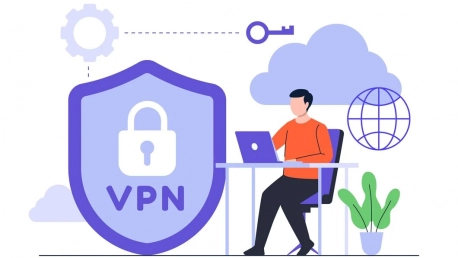In an era where our virtual identities are closely analyzed by various organizations from marketers to state institutions, many turn to Virtual Private Networks (VPNs) as a digital haven. VPNs are sought after for privacy, promising a hidden online presence. Nevertheless, as dependence on VPNs increases, so do concerns about their robustness. Let’s examine the efficiency and security gaps of VPNs, as well as strategies for reinforcing them.VPNs create a secure bridge between users and the internet, encrypting data and masking IP addresses, enabling a more private browsing experience. This technology is critical for users desiring confidentiality online, which is why its trustworthiness must be unwavering. However, VPNs can have weaknesses. Some may keep logs, and others might be susceptible to breaches or governmental scrutiny.In light of these potential vulnerabilities, it’s essential to constantly improve VPNs to ensure rock-solid security. This includes selecting VPNs with strict no-logs policies, strong encryption standards, and a proven track record of resisting attempts to undermine their security. Only then can users maintain confidence in this layer of digital protection.In summary, while VPNs offer a shield against the prying eyes of the digital world, it’s imperative to understand their capabilities and shortcomings. By being informed and choosing the right VPN services, users can fortify their online privacy and remain truly secure in their internet endeavors.
The Basics of VPN Functionality and Importance
VPNs function by establishing an encrypted tunnel for your data to travel through, effectively masking your online activity from various external observers. This technology has become a pivotal tool for individuals who cherish privacy and for businesses that prioritize the protection of sensitive data. Understanding how VPNs function is paramount in recognizing how they secure data and why they have become indispensable in today’s interconnected world. Grasping the core mechanisms of encryption and tunneling that VPNs employ allows us to comprehend their significance and potential failings better.The encryption techniques and tunneling protocols utilized by VPNs are designed to provide a fortress around your internet connection. Still, even the tallest fortress walls can have weaknesses. The encryption strength, often touted in terms of bits like AES-256, plays a crucial role in safeguarding your data. At the same time, the protocols govern how your data is packaged and sent across the internet. Their significance lies in their ability to deliver security without compromising too much on speed or accessibility.
Common Vulnerabilities in VPN Technology
While VPNs are heralded for bolstering online security, they are subject to vulnerabilities. These susceptibilities can range from obsolete protocols to sophisticated cyber-attacks tailored to exploit specific weaknesses. Understanding these potential failings is crucial both for the end-user who relies on VPNs for privacy and for the industry that is tasked with continuously reinforcing these digital bastions against emerging threats.One of the most glaring vulnerabilities lies in the use of outdated tunneling protocols, which are akin to leaving the armored gates of your digital fortress unattended. These archaic protocols may have once stood as industry standards but now serve as exploitable paths for malicious entities. Likewise, the robustness of encryption is only as effective as the lengths to which a cybercriminal is willing to go to breach it. Incremental advancements in computing power relentlessly test the perimeter of what we consider ‘unbreakable.’
Historical Breaches and Learning from the Past
The digital world is rife with stories of breached defenses, and VPNs are not exempt from this narrative. These past incursions serve as stark reminders of the constant tug-of-war between security measures and those determined to circumvent them. By delving into these historical breaches, we can glean valuable insights that foster improved security postures and technologies within the VPN ecosystem.Incidents of compromised VPN services, while unfortunate, have brought to light valuable patterns and lessons. From the exploitation of weaknesses inherent in VPN protocols to breaches resulting from insufficient security measures, they serve as educational waypoints guiding the industry on what to fortify. Each breach has the potential to teach a lesson in vigilance, ultimately contributing to building a more resilient VPN landscape for future users.
Current Trends in VPN Security and Protocols
VPN security is not static; it is a dynamic field continuously buffeted by the winds of technological advancements and changing cyber threat landscapes. As the stakes of maintaining user privacy and data security rise, the industry necessitates a march towards adopting more sophisticated tools and protocols to counteract more inventive cyber threats.The adoption of high-caliber encryption standards like AES-256 has become commonplace among top-tier VPN services. Encryption of this grade resolutely secures user data, rendering it impregnable to all but the most determined and resourceful attackers. Concurrently, a pivot towards protocols such as OpenVPN and WireGuard highlights an industry-wide commitment to balancing enhanced security with high performance. These modern protocols not only reinforce the security perimeter but also optimize it for a seamless user experience.
Selecting a Trustworthy VPN Provider
The labyrinthine world of VPN services can be daunting to navigate, with myriad options vying for your attention. Amidst this crowded field, identifying a VPN provider that aligns with your security needs is paramount. A steadfast VPN service can be the difference between safeguarding your digital footprint and unwittingly casting it before those who seek it.Key to selecting a reputable service is understanding their policies, particularly on data logging. A trustworthy VPN is one that commits to a no-logs policy, ideally validated by independent audits. Other considerations include jurisdiction, as the legal landscape of a VPN’s headquarters can profoundly impact user privacy. Furthermore, the reputation and transparency of providers act as crucial barometers in gauging their dependability.








